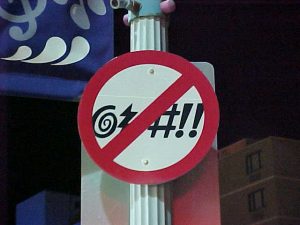
Photo by Ben Schumin (Wikimedia Commons)
- Use proper spelling and grammar so your work is comprehensible.
- Don’t bore the reader.
Most decent writers can follow the first rule almost intuitively. But oddly enough, the second rule seems to not even be on the radar for many people, and it’s critically important if you want to get your message across. Nobody wants to read fluffy, flabby writing: It obscures the point, drowning your message in worthless prattle. And one frequently used bit of grammatical fluffery, which shows up all too often in people’s writing, is known as the expletive construction.
“Expletive”? As in swearing? Well, no, but your editor might just want to utter some expletives under their breath when they read an expletive sentence. The definition of “expletive” is a word or phrase that takes up space in a sentence without adding any meaning. It’s easy to see how swear words fit the meaning of “expletive,” since they’re often used for emphasis rather than carrying any meaning of their own. Similarly, an expletive in grammar refers to a sentence that includes meaningless words that only serve to bog the sentence down. Consider this expletive example:
There are many grammatical issues that can make your writing boring.
Note the use of “there are … that”: This is a very common expletive construction. Those three words add nothing to the meaning of the sentence, though, and removing them makes the sentence much more straightforward:
Many grammatical issues can make your writing boring.
It might be tempting to use the expletive construction in your writing, especially if you’re trying to meet a minimum word count, but wordiness is often the enemy of clarity. An expletive sentence typically buries the actual subject of the sentence a few words in, diminishing the impact of the statement being made.

Photo by worak (Flickr)
- There is/There are
- There was/There were
- It is/It was
Starting a sentence with any of these phrases is a telltale sign of the expletive construction.
But should you always remove an expletive phrase? Well, no. We’re not big fans of “always” and “never.” The expletive construction does have its place, but it should be used sparingly and purposefully, in order to give the reader a little mental pause before refocusing their attention on the actual subject of the sentence. Starting a paragraph with the expletive construction is generally a bad idea, and like with any rhetorical device, don’t overdo it.

“Starting a paragraph with the expletive construction is generally a bad idea, and like with any rhetorical device, don’t overdo it.”
I agree, but “and as with any rhetorical device…” would be better.
Ah, the shifting rules of grammar! Yes, “as” is technically more correct, though it’s probably less common.
Less common or not, the flow of the sentence is better with ‘as’ and the annoying newspeak use of ‘like’ cannot be conjured
It seems a little less natural-sounding with “as.” But to each their own.
You should participate in a competition for one of the finest websites on the web.
I’m going to recommend this site!
I love to write. I’ve been checking everything out to see if I have it in me to become a freelance writer. I am learning so much right now it is making my head swim! I do know most of all the rules mentioned here, but there is still a different sort of style for this type of “Internet ” writing. (Did I do my quotes right for the word “Internet”?) I’m not quite sure I have this kind of talent that is so necessary in order to be an effective and good writer? Sometimes, when I am trying to do something perfect, it ends up taking away from my own natural abilities. I end up worrying too much, if I am doing it right or not, so it destroys what used to come natural to me. This is my biggest fear. Do I have it, or don’t I? I guess I’ll never know until I try, right?
If you’re good at writing, it’s definitely worth a try! If you’re looking to work with us, our application is here: https://www.onlinewritingjobs.com/new-general-signup/ . We also have a few blog posts about freelancing, if you want to learn more about it before diving in: https://www.onlinewritingjobs.com/category/freelancing/ .